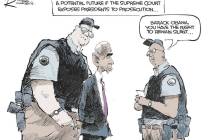An irreplaceable source of information
As an exercise in self-abuse and futility, I typed into the ubiquitous Google slot these words: "newspapers are dead." I got more than 3.3 million hits.
Of course, a few of them said newspapers are not dead or not dead yet.
It certainly is a topic of considerable debate and navel gazing, especially among newspaper staffers, for whom this is hardly academic chin scratching. Our careers and mortgages are on the line.
The doomsayers tell us the Internet will supplant newspapers within a decade, because it delivers news almost instantaneously instead of only once a day. And does it with more bells and whistles, flashy color graphics, audio and video. It's searchable and programmable.
In the future, these wags say, everyone will be a citizen journalist aggregating collective experiences in a vast database of ideas, information and opinions, making the professional reporter as obsolete as wooden type.
This dismal prognostication ran through my mind as I looked over the list of winners in this year's Nevada Press Association Better Newspaper Contest. As usual, the Review-Journal's writers, editors, photographers, artists and designers fared well, earning four dozen plaques or certificates for their work in competition with the state's largest newspapers, as recognized by our peers in the industry. What struck me as significant were some of the key awards.
For example, the Review-Journal earned first place for Community Service for a series of stories about the county's handling of abused and neglected children. The judges explained: "The stories show how officials failed to monitor cases that resulted often in tragedy. ... By getting her hands on censored material, reporter Lisa Kim Bach sheds light on how a system failed to protect those that needed it most."
Those stories continued for months. Most were lengthy and detailed. Bach had to dig and scrape and cajole.
Or, take the first-place award for Best Explanatory Journalism. This went to our special projects team headed by A.D. Hopkins. They delved into the changes in Las Vegas wrought by the tragedy of 9/11. This package of stories was thoroughly researched and exhaustively reported. If a television or radio reporter were simply to read the stories aloud, it would take a three-hour special.
First place in Best Investigative or In-Depth Story or Series also went to the special projects team, with Frank Geary as the lead writer for a series about local judges sealing court records and entire cases without any explanation whatsoever. The series prompted the state Supreme Court to step in to rectify the situation. Rules for sealing records are being written and they will require openness and public scrutiny.
The contest judges said the series stands out because of its original premise. Now, what citizen journalist would take months to dig for records, argue with bureaucrats and then spend hours writing out his findings, citing example after example of injustices and potential favoritism?
As for the self-absorbed bloggers out in the ether, I'll put our commentary writers up against any and all. Contest judges agreed.
In the category of Best Local Column, Erin Neff and Jane Ann Morrison finished No. 1 and No. 2, respectively. Judges praised Neff's "strong command of logical argument" and Morrison's ability "to apply a lighter touch to highlight a serious issue."
Then there was the clean sweep in Best Editorial Writing with R-J editorial writers Glenn Cook, John Kerr and Vin Suprynowicz taking first, second and third, respectively, for their well-reasoned and hard-hitting editorials. Because our editorials are unsigned, this is their chance to be publicly recognized.
First place for Best Critical Writing went to Review-Journal food writer Heidi Knapp Rinella. "Her reviews seem to say 'I'm in your restaurant, and I'm on to you.' Irresistible reading," the judges wrote.
In sports commentary, first place went to Joe Hawk and second to Ed Graney. (Third place went to Erin Neff's husband, Jeff Haney, over at the Sun.)
As for all those amateur photographs that clutter the Web, few can touch those of the Review-Journal's pros. Photo chief Jeff Scheid captured Photo of the Year with a picture taken at a house fire that claimed the life of a 5-year-old.
(The entire list of awards appears elsewhere in the newspaper today. Pay no attention to the fact this column didn't catch squat.)
My point here is not to pat ourselves on the back, but to observe that, if the dinosaur newspaper dies, a great force for political and societal redress will be lost.
Thomas Mitchell is editor of the Review-Journal and writes about the role of the press and access to public information. He may be contacted at 383-0261 or via e-mail at tmitchell @reviewjournal.com.
THOMAS MITCHELLMORE COLUMNS























